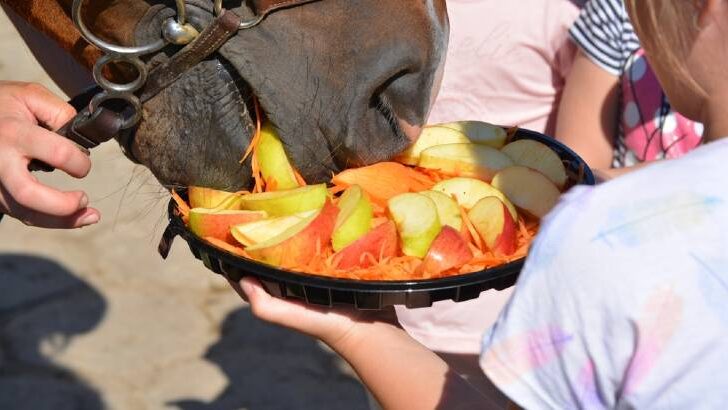Affiliate Disclaimer
As an Amazon Associate I earn from qualifying purchases. It helps me keep the website going. Thank you for your support.
Starting to negotiate a horse lease can be a tricky process, but if done correctly can be very rewarding. Leasing a horse is a great way to get more experience before you buy your own horse. It is important to negotiate the terms of the lease to make sure both parties are happy.
When you negotiate a horse lease, make sure you know what you want and be clear about the terms. Research the horse prior and consider a trial period. You can negotiate the price, so make sure you know your budget before you start. Lastly, good communication and a written contract are key to a successful horse lease.
In this article, we’ll explore some tips and strategies to help you negotiate a horse lease successfully. Read on to learn more!
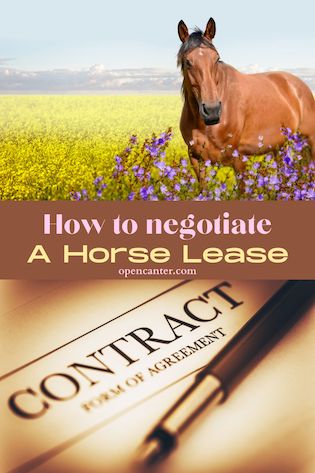
What Do I Need to Know To Negotiate a Horse Lease?
It’s important to have a clear idea of your skill level and what you want out of the lease. Talk to your instructor about your riding goals. They will be able to advise what type of horse will suit – they might even know of one! Here are some tips on deciding if you are ready to lease a horse.
Outline which things are non-negotiables for you. These things might be the price, the height or education of the horse, or the type of lease. For example, if you want to compete, then you must have the ability to take the horse off the property.
Also, decide roughly how long you want to lease the horse for. If the lease is a stepping stone to horse ownership, you might only lease for one year. However, if leasing will be your permanent option, then you will be looking for a much longer lease period.
Understanding Lease Terminology
Also, make sure you understand the terminology. The word ‘lessor’ refers to the person who owns and is leasing the horse to you. The ‘lessee’ is the person who is leasing the horse.
There are also different terms depending on the type of lease. The most common types include a full lease and a half or partial lease. You can read more about the different types of horse leases here.
A full lease situation is most like horse ownership. This is where the lessee is responsible for all care and costs and always has access to the horse. They may or may not be required to pay a lease fee.
In a half or partial lease, the costs are split equally between the lessee and the owner or another lessee. The lessee has access to the horse on an agreed number of days per week, and can only ride on those days. In lieu of splitting costs, the lessee may just pay a lease fee that partially covers these costs (source).
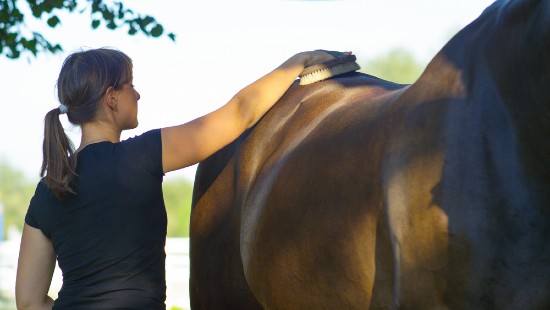
Can I Negotiate How Much the Lease Costs?
The price of the lease varies greatly and depends on several things. These include the horse’s age, training, and experience. It also depends on the individual arrangement with the owner, and whether it is a full or partial lease.
Before starting negotiations, you will have already decided what figure is in your budget for the lease. During negotiations, you need to be aware not only of the lease fee but any other costs you are responsible for.
For example, in a full lease, you may, or may not, pay a lease fee to the owner. However, you will likely be responsible for most other costs for the horse. This includes feed, the farrier, and routine vet, dental or body work.
In a partial lease, you will likely be asked to pay a lease fee to the owner. You may or may not be responsible for contributing towards other costs.
You also need to ask about who is responsible for the purchase of saddlery and gear for the horse. The horse may come with gear as part of the lease; in which case the lessee shouldn’t have to purchase new items.
However, if the horse does not come with any saddlery or gear, you will need to purchase these items. They can come at a considerable cost, however, are yours to keep after the lease ends. You will also be responsible for your helmet, boots, gloves, and other riding apparel.
You will also be responsible for the cost of your lessons. If you want to compete, you will also be responsible for the cost of transport and entry fees. Transport might mean hiring a horse trailer or negotiating the use of the lessor’s trailer as part of the lease.
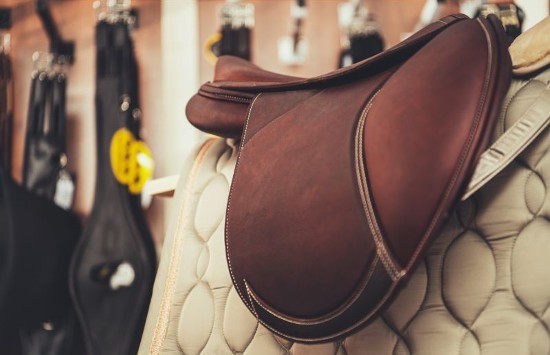
Can I Negotiate a Horse Lease With More Riding Time?
How often you ride will depend on the type of lease. A full lease means that you can usually ride whenever you please. There are usually no restrictions on what day or time you ride, only that you ride the horse in line with their fitness level.
If you take out a partial lease, it’s not likely that you will be able to change how often you ride from the original agreement. This is because you are sharing with someone else, who has also agreed to a certain amount of riding time.
What About Negotiating Where the Horse is Kept?
Most lease agreements will require the horse to be kept at a boarding barn or on the owner’s property. This is especially true for half-leases or leases on lesson horses.
However, you can negotiate to have the horse live elsewhere, either at another facility or on your own property. You will need to show the owner that you have adequate facilities to keep the horse. You will likely also be liable for boarding costs if you choose your own barn. If you want to keep the horse at home, the cost of upgrading things like fencing or stables will be your responsibility.
Should I get a Written Contract for a Horse Lease?
Most definitely! Even arrangements between friends that seem very informal should still be in writing. While verbal contracts are still binding, they are very difficult to prove should a dispute arise.

The contract should cover everything agreed to in the lease. This includes the details of the horse, the length of the lease, and who is responsible for what. It should detail the cost, and how any fees are required to be paid and when.
It must also contain who is responsible for decisions about the horse’s care. This includes who can decide what happens in emergencies. This doesn’t only mean who calls what vet and when, but who can change what feed the horse eats.
The contract must also outline other terms specific to that lease. For example, can the horse only be ridden doing certain activities? If the horse is a mare or stallion, can the lessee use it for breeding? Are other people allowed to ride the horse or only the named lessee? If the horse competes, wins and its value goes up, does the cost of the lease increase?
The contract will also outline the process to terminate the lease, both for the lessor and lessee. It should also contain the process to extend the lease.
Lease contracts can become quite complicated. While lots of templates are available online cheaply or for free, it is recommended to involve a lawyer. The contract is there to protect both the lessor and the lessee, as well as the horse.
Once the contract has been drawn up, make sure both you and the lessor sign it. Both of you should keep a copy for your records.
How Do I Negotiate Changes to a Horse Lease?
If you want to change something that is in an existing lease agreement, you must speak to the lessor. Once you have entered into a written contract, there is very little flexibility unless you alter the terms.
Before you do, make sure you have a clear idea about what you want. Also, have a clear idea about if you can afford extra lease fees, should that be required.
For example, you hold a full lease where the horse is required to stay on the property. Your skills have improved and now you want to attend some local shows. Set up a time with the owner to discuss changing the lease to allow the horse to leave the property.
Keep the conversation civil and don’t let emotions get involved. Most owners are willing to discuss things with you and will have valid reasons to deny your request. Alternatively, they may accept your request but add other conditions.
For example, the owner permits you to take the horse to one competition per month. The competition must be located within 100 miles of the property. The contract will outline that the lessee is responsible for all entry and transport costs. You might also be responsible for buying new saddlery fit for competition if required.
If you do negotiate changes, make sure that the written contract is updated. It needs to detail the new changes and be signed again by both parties.

How do I Find a Suitable Horse?
Once you have a clear idea about what type of horse you want to lease, it’s time to start looking. Your instructor or local stable is a good place to start. The barn at which you ride might offer a lease program on its lesson horses.
You could put up a flyer at local barns or equestrian centers to advertise that you’re looking to lease. Make sure you include the details of the type of horse and what you want to do on the flyer. That way, owners of suitable horses can get in touch with you.
Once you have found a potential lease horse, it is important to research that horse. Find out everything that you can about the horse’s age, breed, training, and health history. Visit the horse and watch it being handled and ridden, and if possible, do these things yourself.
Don’t be afraid to ask the owner or trainer questions about the horse. It is also recommended that you take someone knowledgeable with you to view the horse. This could be your instructor or a friend who is an experienced horse person.
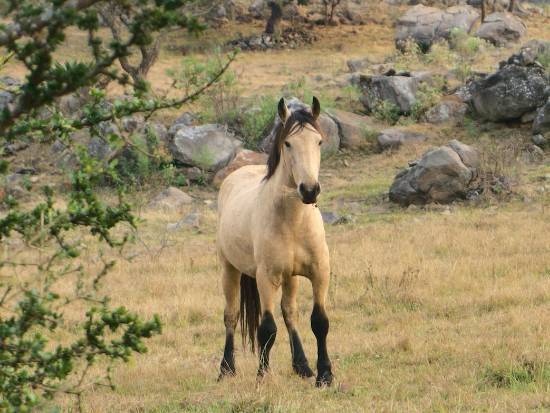
Further Tips For a Successful Horse Lease?
The most important tip is to maintain open communication with the horse’s owner. Don’t be afraid to ask them questions or raise concerns. Some owners may even offer to give you a hand learning about horse ownership during the lease.
It is far better to speak up when you first have a concern than let it wait. Approach the conversation with an open mind to find a solution that works for everyone involved.
Most owners enjoy being kept up to date with their horse’s achievements. This is especially true for leases where you are allowed to compete. Building a positive relationship with the lessor also means it will be easier to have conversations about changing the lease.
Final Thoughts
It can be challenging to negotiate a horse lease, so set yourself up for success by following the above advice. Remember to do your research beforehand and communicate your expectations openly and honestly. Seeking advice from an experienced horse person can go a long way in making the process go smoothly. With a little effort and negotiation, you can enjoy the benefits of horse ownership without the long-term commitment and expense.




